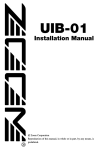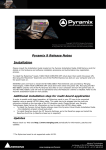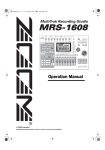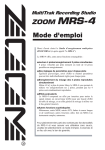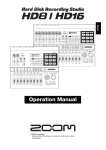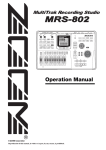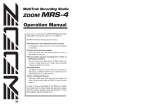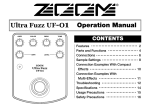Download MRS-802 Version 2.0 Supplemental Manual
Transcript
MRS802v2(E).fm 1 ページ 2004年5月27日 木曜日 午後5時59分 MRS-802 Version 2.0 Supplemental Manual This document explains functions and features that have been added to the MRS-802 Version 2.0. Contents New features of MRS-802 Version 2.0 . . . . . . . . . . . . . . .2 Using MIDI Time Code (MTC) . . . . . . . . . . . . . . . . . . . . . . .3 About the MIDI Time Code (MTC) . . . . . . . . . . . . . . . . . . . . . . . . . 3 Making MIDI Time Code (MTC) settings . . . . . . . . . . . . . . . . . . . . 3 Continuous project playback (sequence play function) . . . . . . . . . . . . . . . . . . . . . . . . .4 About sequence play . . . . . . . . . . . . . . . . . . . . . . . . . . . . . . . . . . . 4 Creating a playlist . . . . . . . . . . . . . . . . . . . . . . . . . . . . . . . . . . . . . . 4 Playlist playback . . . . . . . . . . . . . . . . . . . . . . . . . . . . . . . . . . . . . . . 6 Creating a CD using the disc-at-once method . . . . . . . .7 About track-at-once and disc-at-once . . . . . . . . . . . . . . . . . . . . . 7 Creating an audio CD by album . . . . . . . . . . . . . . . . . . . . . . . . . . . 7 Using the marker function to separate tracks . . . . . . . . . . . . . . . . 9 Including a playlist in an album . . . . . . . . . . . . . . . . . . . . . . . . . . 10 Showing the master fader setting . . . . . . . . . . . . . . . . . .11 MIDI implementation chart . . . . . . . . . . . . . . . . . . . . . . . .12 The FCC regulation warning (for U.S.A.) This equipment has been tested and found to comply with the limits for a Class B digital device, pursuant to Part 15 of the FCC Rules. These limits are designed to provide reasonable protection against harmful interference in a residential installation. This equipment generates, uses, and can radiate radio frequency energy and, if not installed and used in accordance with the instructions, may cause harmful interference to radio communications. However, there is no guarantee that interference will not occur in a particular installation. If this equipment does cause harmful interference to radio or television reception, which can be determined by turning the equipment off and on, the user is encouraged to try to correct the interference by one or more of the following measures: • Reorient or relocate the receiving antenna. • Increase the separation between the equipment and receiver. • Connect the equipment into an outlet on a circuit different from that to which the receiver is connected. • Consult the dealer or an experienced radio/TV technician for help. © ZOOM Corporation Reproduction of this manual, in whole or in part, by any means, is prohibited. MRS802v2(E).fm 2 ページ 2004年5月27日 木曜日 午後5時59分 New features of MRS-802 Version 2.0 The MRS-802 Version 2.0 incorporates the following additional features. • MIDI Time Code (MTC) send support In addition to the Timing Clock transmission offered by the MRS-802 Version 1.x model, the MRS802 Version 2.0 can also output MIDI Time Code (MTC) messages. Whereas the conventional Timing Clock signal is based on tempo information set internally by the MRS-802, the MTC specifies the current position in hours/minutes/seconds/frames, representing absolute time information. This assures more stable operation compared to Timing Clock and allows the tempo to be freely set or changed at the receiving device. • Continuous playback of multiple projects (sequence play) By entering the master tracks of multiple projects in a playlist, these can be played automatically in succession. This is useful to record several projects in one go on an external recorder or to create automatic accompaniment for a number of songs. Because the playlist information can be used when creating an album for burning a CD, you can check the song sequence before deciding on the final content of the album. • Support for disc-at-once CD creation In addition to the track-at-once method which inserts blank gaps between tracks on an audio CD, the MRS-802 Version 2.0 also supports the disc-at-once method which writes tracks continuously without gaps. Using disc-at-once, it is easy to create a non-stop CD with seamless content. You can also divide one project into several tracks and write the result to an audio CD. This makes it possible to create a CD of a continuous live performance which still allows jumping back and forth to specific songs. • Display [MASTER] fader settings When playing an audio CD or a playlist using the sequence play function, the [MASTER] fader settings are shown on the display while the fader is being operated to adjust the volume. The value appears automatically on the display as soon as the [MASTER] fader is moved, and the original display appears again after the adjustment is finished. ZOOM MRS-802 Ver 2.0 2 MRS802v2(E).fm 3 ページ 2004年5月27日 木曜日 午後5時59分 Using MIDI Time Code (MTC) About the MIDI Time Code (MTC) In addition to the conventional Timing Clock output, the MRS-802 Version 2.0 also supports the MIDI Time Code (MTC). Whereas the conventional Timing Clock signal is based on tempo information set internally by the MRS802, the MTC specifies the current position in hours/ minutes/seconds/frames, representing absolute time information. This assures more stable synchronization than with Timing Clock, and allows the tempo to be freely set at the receiving device. The device sending the MTC signal is called the MTC master and the receiving device is called the MTC slave. The MRS-802 Version 2.0 can operate only as MTC master. For synchronization, the device operating as MTC slave must be set to lock onto the MTC signal. The frame rate per second can be selected from 24, 25, 29.97 and 30, to match the connected device. For example, to connect the MRS-802 Version 2.0 to a MIDI sequencer for synchronization, make connections as follows. 2. Utility MIDI 3. Press the [ENTER] key. The display changes as follows. Now you can select MIDI-related setting items. MIDI DRUM CH 4. MTC slave MTC MIDI IN Sequencer Press the [ENTER] key, and turn the dial to change the setting. The following settings are available. MTC 30 MIDI OUT connector MRS-802 Use the cursor left/right keys to bring up the indication “MIDI MTC” on the display. MIDI MTC 5. MTC master Use the cursor left/right keys to bring up the indication “Utility MIDI” on the display. • 24 (24 frames/second) Making MIDI Time Code (MTC) settings This setting determines whether MIDI Time Code (MTC) messages are used for MIDI synchronization. 1. Press the [DRUM] key in the rhythm section, and then press the [UTILITY] key. The rhythm utility menu for making various rhythm section settings appears. • 25 (25 frames/second) • 29.97nd (29.97 frames/second, non-drop) • 30 (30 frames/second, non-drop) When the MRS-802 Version 2.0 runs, MTC signals will be sent out at the selected frame rate. • OFF No MTC signals are sent. 6. When you have finished making settings, press the [EXIT] key several times. The unit returns to the main screen. Utility Drum Kit ZOOM MRS-802 Ver 2.0 3 MRS802v2(E).fm 4 ページ 2004年5月27日 木曜日 午後5時59分 Continuous project playback (sequence play function) 4. About sequence play The MRS-802 Version 2.0 can play the master tracks of multiple projects stored on the hard disk in succession (sequence play). This is useful to record several projects in one go on an external recorder or to create automatic accompaniment for a number of songs. Up to 99 projects can be specified for sequence play, and the selection can be saved as a playlist. You can have up to 10 different playlists. Because the playlist information can be imported to an album for burning tracks on a CD in the order of the playlist, you can use the function to check the song sequence before deciding on the final content of the CD. Creating a playlist Turn the dial to select the playlist for which you want to register projects, and press the [EDIT] key. The screen for registering projects in the playlist appears. The indication “END OF LIST” denotes the end of the playlist. When the playlist is empty, the indication “END OF LIST” appears at the beginning of the list. END OF LIST 0 0 1 0 5. Turn the dial to select the project to register at the beginning of the project. The display indication changes as follows. Project number and project name Number and name of project to write as a track Register projects in a playlist as follows. 1. PRJ 001 PRJ001 Verify that the V-take you want to play is selected for each project’s master track. 1 436120 Track number Number of track to write on CD-R/RW disc 2. From the main screen, press the [PROJECT] key in the display section. The project menu for various project-related functions appears. V-take duration Length of the V-take selected for the master track of the project, in hours (H), minutes (M), seconds (S), and milliseconds (MS) NOTE PROJECT SELECT • Projects in which an unrecorded V-take is selected for the master track cannot be registered in a playlist. If the name of 3. Use the cursor left/right keys to bring up the indication “PROJECT SEQ PLAY” on the display, and press the [ENTER] key. The display shows the screen for selecting a playlist. If there are no existing playlists, the display shows “EMPTY”. SEQ PLAY EMPTY 0 0 0 a desired project does not appear on the display, check the Vtake selected for the master track. • If the V-take is less than 4 seconds long, the master track cannot be registered in the playlist. 6. Press the cursor right key. The display indication changes as follows. (The END OF LIST indication has moved to the second position.) In this condition, you can select the second project to play. 1 END OF LIST 2 ZOOM MRS-802 Ver 2.0 4 MRS802v2(E).fm 5 ページ 2004年5月27日 木曜日 午後5時59分 Continuous project playback (sequence play function) 7. Turn the dial to select the next project to play. Use the same procedure to select projects for subsequent positions. A maximum of 99 projects can be registered in a playlist. ● To change projects in a playlist Use the cursor left/right keys to select the playback number for which you want to change the project, and use the dial to select another project. ● To insert a project in a playlist 8. When you have registered all desired projects in the playlist, press the [EXIT] key several times to return to the main screen. HINT The playlist contents are stored automatically. NOTE If the master track data for projects included in a playlist have been deleted from the hard disk, the playlist returns to the blank state. Use the cursor left/right keys to select the playback number where you want to insert a project. Press the [INSERT/COPY] key in the control section. The indication “INSERT?” appears on the display. In this condition, use the dial to select another project, and press the [ENTER] key. (Subsequent projects are renumbered.) ● To delete a project from a playlist Use the cursor left/right keys to select the playback number you want to delete. Press the [DELETE/ ERASE] key in the control section. The indication “DELETE SURE?” appears on the display. To delete the project from the playlist, press the [ENTER] key. (Subsequent projects are renumbered.) ● To delete all projects from a playlist On the playlist registration screen, press the [DELETE/ERASE] key in the control section and then the cursor down key. The indication “ALL DEL SURE?” appears on the display. To delete all projects from the playlist, press the [ENTER] key. ● To switch the V-take for the master track Press the [EXIT] key repeatedly to return to the main screen. Load the project for which you want to switch the V-take, and select the V-take for the master track. Then return to the playlist registration screen. ZOOM MRS-802 Ver 2.0 5 MRS802v2(E).fm 6 ページ 2004年5月27日 木曜日 午後5時59分 Continuous project playback (sequence play function) ● PLAY[R] key Playlist playback Select the playlist for continuous project playback as follows. 1. From the main screen, press the [PROJECT] key in the display section. The project menu appears. 2. Use the cursor left/right keys to bring up the indication “PROJECT SEQ PLAY” on the display, and press the [ENTER] key. The display shows the screen for selecting a playlist. The counter in the bottom of the display shows the total playback time of all projects in the playlist. Starts playback from the beginning of the current project. ● STOP[P] key Interrupts project playback and returns to the start of the current project. ● ZERO[U] key Returns to the project registered for playback position 1. ● FF[Y] key Playback stops, and the system jumps to the beginning of the next project. ● REW[T] key SEQ PLAY 3 Songs 0 0 1 0 Total playing time of projects 3. Playback stops, and the system jumps to the beginning of the previous project. Turn the dial to select the desired playlist. 4. When playback of the last project is completed, the recorder stops. 5. To return to the main screen, press the [EXIT] key several times. Press the PLAY [R] key. Projects are played in the order as registered in the playlist. The display indication changes as follows. PLAY PRJ001 Project name 1 Current playback number Use the [MASTER] fader to adjust the playback volume. When a project has played through, the next project is automatically loaded and played. During project playback, the following keys can be used to select a track, pause play, or locate a certain point. ZOOM MRS-802 Ver 2.0 6 MRS802v2(E).fm 7 ページ 2004年5月27日 木曜日 午後5時59分 Creating a CD using the disc-at-once method About track-at-once and disc-atonce The MRS-802 Version 2.0 offers two ways of creating an audio CD from an album. The track-at-once method inserts blank gaps between tracks on an audio CD, while the disc-at-once method writes tracks continuously without gaps. Using disc-at-once, you can create a nonstop disc or a disc of a live performance that allows skipping by song units. For both methods, finalizing is carried out automatically at the end, so adding material to the CD later is not possible. The characteristics of trackat-once and disc-at-once are described in detail below. ● Track-at-once (TAO) The master tracks of projects registered in the album are written to the CD one by one, while inserting gaps between them. When a CD written with track-at-once is played on a CD player, a mute section of two seconds follows each track. This method is suitable for creating a regular music CD where each track is separated by blanks. Creating an audio CD by album Because the MRS-802 Version 2.0 lets you select between track-at-once (TAO) and disc-at-once (DAO) for writing the audio CD, the procedure for creating an audio CD by album changes as follows. HINT You can include playlist information created with the sequence play function in the album (→ P.10). NOTE Before starting the procedure, use the trimming function on the V-takes to be used as source material. 1. Insert a CD-R/RW disc into the integrated CD-R/RW drive. Use a blank CD-R/RW disc or a CD-RW disc that has been completely erased. 2. ● Disc-at-once (DAO) The master tracks of projects registered in the album are written to the CD in a single operation without gaps. When a CD written with disc-at-once is played on a CD player, the disc plays through without interruption, because the multiple tracks are joined seamlessly. If necessary, you can use marks as PQ subcode information (indicating track start/end points and other information) to divide a single project into multiple tracks for creating the audio CD. This is convenient to make a CD of a continuous live performance where the listener can still jump to specific songs. HINT If you burn the CD with disc-at-once, but still want to have blanks between specific songs, you should add a blank portion to the master track of each respective project. Verify that the V-takes you want to use for the audio CD are selected for the master tracks of the projects. 3. From the main screen, press the [CD-R/ RW] key in the display section. The CD-R/RW menu appears. 4. Verify that “CD-R/RW AUDIO CD” is shown on the display and press the [ENTER] key. The display indication changes as follows. AUDIO CD BURN CD 5. Use the cursor left/right keys to bring up the indication “AUDIO CD ALBUM” on the display, and press the [ENTER] key. In this condition, you can select the write method. ALBUM TYPE:DAO ZOOM MRS-802 Ver 2.0 7 MRS802v2(E).fm 8 ページ 2004年5月27日 木曜日 午後5時59分 Creating a CD using the disc-at-once method 6. Turn the dial to select “DAO (disc-at-once)” or “TAO (track-at-once)”, and press the [ENTER] key. The screen for registering projects for the album appears. 9. END OF PROJECT 0 0 1 0 2 Turn the dial to select the project to be used as track 2 of the album. 10. In the same way, select projects for track 3 The indication “END OF PROJECT” denotes the end of the album list of projects. When the album display is first called up, no project has been registered, therefore the indication “END OF PROJECT” appears. 7. Turn the dial to select the project to be used as track 1 of the album. The indication “END OF PROJECT” moves up to the next track (track 2 in this example), and the screen changes as follows. Project number and project name Number and name of project to write as a track PRJ 001 PRJ001 END OF PROJECT 1 436120 Track number Number of track to write on CD-R/RW disc V-take duration Length of the V-take selected for the master track of the project, in hours (H), minutes (M), seconds (S), and milliseconds (MS) Pressing the PLAY [R] key in this condition will play the master track of the currently displayed project. NOTE • A project for whose master track an unrecorded V-take is selected cannot be chosen as source material. Make sure that and subsequent tracks. The maximum allowable number of tracks is 99, provided that there is enough free capacity on the disc. HINT When you press the cursor down key, the second line of the display shows “REMAIN”, and the remaining write time on the inserted CD-R/RW disc appears on the counter. Press the cursor up key to return to the previous indication. ● To change projects in an album Use the cursor left/right keys to select the track number for which you want to change the project, and use the dial to select another project. ● To insert projects in an album Use the cursor left/right keys to select the track number where you want to insert a project. Press the [INSERT/COPY] key in the control section. The indication “INSERT?” appears on the display. In this condition, use the dial to select another project, and press the [ENTER] key. (Subsequent tracks are renumbered.) ● To delete a project from an album Use the cursor left/right keys to select the track number you want to delete. Press the [DELETE/ ERASE] key in the control section. The indication “DELETE SURE?” appears on the display. To delete the project from the album, press the [ENTER] key. (Subsequent tracks are renumbered.) a V-take that you want to use is selected. • If the master track data for projects included in an album have been deleted, the album returns to the blank state. 8. When the project for track 1 has been selected, use the cursor right key to move to track 2. The display indication changes as follows. ● To delete all projects from an album On the album screen, press the [DELETE/ERASE] key in the control section and then the cursor down key. The indication “ALL DEL SURE?” appears on the display. To delete all projects from the album, press the [ENTER] key. ZOOM MRS-802 Ver 2.0 8 MRS802v2(E).fm 9 ページ 2004年5月27日 木曜日 午後5時59分 Creating a CD using the disc-at-once method ● To switch the V-take for the master track Press the [EXIT] key repeatedly to return to the main screen. Load the project for which you want to switch the V-take, and select the V-take for the master track. Then return to the album screen. 11. When you have stored all desired projects in the album, press the [ENTER] key twice. The display indication changes as follows. ALBUM SURE? Using the marker function to separate tracks When you create an audio CD using the disc-at-once method, marker information included in the project can be used to generate PQ subcode information (specifying track start/stop position and other items) to split up a single project into multiple tracks. Marker-based track separation can be enabled or disabled for each project. For example, when a project contains a number of songs that were recorded live, you can set a mark at the beginning of each song, so that these will be recorded as different tracks on the CD. This will enable easy searching and jumping between tracks. HINT If you press the [ENTER] key once more, the indication “CD xx Trk BURN?” (where xx is the number of tracks) appears on the display. You can check the total number of tracks that will be written to the disc from this screen. 12. To carry out the write process, press the [ENTER] key once more. By pressing the [EXIT] key instead of the [ENTER] key, you can cancel the operation and back up one step at a time. When you start the write procedure, the display shows “wait...” for track-at-once or “init...” for disc-atonce. The counter indicates the progress status of the write process. When the write process is completed, the disc is ejected automatically, and the message “ALBUM NEXT?” appears on the screen. To write another disc with the same content, insert a blank CD-R/RW disc or a CD-RW disc which has been completely erased, and press the [ENTER] key. To terminate the process, press the [EXIT] key. 13. To return to the main screen, press the [EXIT] key several times. NOTE To use the marker-based track separation function, at least two marks (including the project start mark 00) must be set. 1. Load the project that you want to split into multiple tracks, and set marks at the points where the tracks should be separated. Marker-based track separation can only be enabled or disabled for the entire project. Delete any unnecessary marks beforehand. 2. Perform steps 1 - 6 of “Creating an audio CD by album”, select the disc-at-once (DAO) write method, and bring up the album screen. END OF PROJECT 0 0 1 0 3. Use the cursor left/right keys and the dial to register projects for the album. 4. Use the cursor left/right keys to select a project that is to be divided into multiple tracks. 5. Press the [MARK] key in the control section. Marks contained in this project will be used as PQ subcodes. The indication “PQ” is shown at the top right of the display. By pressing the [MARK] key again, you can return to the ZOOM MRS-802 Ver 2.0 9 MRS802v2(E).fm 10 ページ 2004年5月27日 木曜日 午後5時59分 Creating a CD using the disc-at-once method previous condition. The marker enable/disable selection can be made at any time while the album screen is shown. If the mark function is enabled for the project registered as track 1 of the audio CD, the following indication appears. PRJ001 PROJ001 HINT When you divide a project, the number of tracks on the album will increase, and tracks corresponding to subsequent projects will be renumbered. For example four marks are set for the project, the tracks on the audio CD will be allocated as follows. Project 1 (marker-based separation Project 2 (marker-based enabled) separation disabled) Track 2 Track 3 The MRS-802 version 2.0 lets you register the master tracks of multiple projects in a list (playlist) for continuous playback in a sequence (→ P.4). It is possible to include playlist information when creating an audio CD by album. 1 436120 Audio CD track Track 1 numbers Including a playlist in an album Track 4 Track 5 The subsequent steps for creating the audio CD are as described in the previous section. You can create up to ten playlists, but only one can be included in an album. 1. Perform steps 1 - 6 of “Creating an audio CD by album”, and bring up the album screen on the display. END OF PROJECT 0 0 1 0 2. Press the [UTILITY] key in the display section. The display indication changes as follows. In this condition, you can select the playlist (1 - 10) to include in the album. NOTE IMPORT PlayList • If the tracks have not been separated as expected, press the [EXIT] key repeatedly to return to the main screen, and check 1 Playlist number whether marker information has been created properly for the project. • If marks are too close together, the indication “Track Is Short” appears on the display, and marker-based separation cannot be enabled for that project. • The maximum number of tracks per album is 99. If you attempt to enable marker-based separation for a project and 3. Turn the dial to select the playlist, and press the [ENTER] key. The indication “IMPORT SURE?” appears on the display. this causes the number of tracks to exceed 99, the indication “Too Many Track” appears, and marker-based separation IMPORT SURE? cannot be enabled. 4. To import the playlist information, press the [ENTER] key. The procedure is carried out, and the album screen returns. HINT After importing playlist information, you can edit the album as normal. ZOOM MRS-802 Ver 2.0 10 MRS802v2(E).fm 11 ページ 2004年5月27日 木曜日 午後5時59分 Showing the master fader setting The MRS-802 Version 2.0 can show the [MASTER] fader settings on the display when the fader is being operated while playing an audio CD or a playlist using the sequence play function. 1. Perform playback of an audio CD inserted in the CD-R/RW drive or of a playlist. For example, when you play a playlist, the display changes as follows. PLAY PRJ001 1 2. Operate the [MASTER] fader. The playback volume changes and the [MASTER] fader setting is shown within the range of 0 - 127. PLAY VOLUME 100 Two seconds after you stop moving the [MASTER] fader, the display of step 1 appears again. NOTE • If analog playback is selected as audio CD playback method (headphone output of CD-R/RW drive is active), operating the [MASTER] fader has no effect. • The above operation does not change the [MASTER] fader setting value stored as part of the project. ZOOM MRS-802 Ver 2.0 11 MRS802v2(E).fm 12 ページ 2004年5月27日 木曜日 午後5時59分 MIDI implementation chart [Hard Disk Recorder] Model MRS-802 MIDI Implementation Chart Function Transmitted Recognized Basic Channel Default Changed 1-16, OFF 1-16, OFF 1-16, OFF 1-16, OFF Mode Default Messages 3 x 3 x Altered 32-73 True voice ****************** 32-73 ****************** Velocity Note ON Note OFF o x o x After Touch Key's Ch's x x x x x 7 o 7 11 Note Number Pitch Bend Date: 24 May 2004 Version: 1.01 Remarks Memorized Volume Expression Control Change 120 All Sounds Off 121 Reset All Ctrls Prog Change x ****************** x x Qtr Frame o x Song Pos Song Sel o x x x Tune x x System Real Time Clock Commands Local ON/OFF o o x x x x Aux Messages All Notes OFF Active Sense Reset o x x o x x True # System Exclusive System Common x MTC quarter frame message is transmitted. Notes "Mode 1: OMNI ON, POLY "Mode 3: OMNI OFF, POLY Mode 2: OMNI ON, MONO Mode 1: OMNI OFF, MONO o: Yes x: No ZOOM CORPORATION NOAH Bldg., 2-10-2, Miyanishi-cho, Fuchu-shi, Tokyo 183-0022, Japan PHONE: +81-42-369-7116 FAX: +81-42-369-7115 Web Site: http://www.zoom.co.jp MRS-802 ver2.0 - 5000-1













